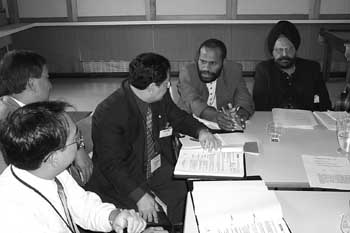ASNO, in collaboration with DFAT, Defence Science and
Technology Organisation (DSTO), the Royal Australian Chemical Institute (RACI)
and the Organisation for the Prohibition of Chemical Weapons (OPCW), co-hosted a Chemical
Weapons Convention (CWC) Regional Workshop held in Melbourne from 30 April to 3
May 2001 (see media release page 91). The Workshop underlies Australias
commitment to the promotion of international cooperation and assistance under
the Convention especially in South East Asia and the South Pacific. Support was provided by AusAID and the
Plastics and Chemicals Industries Association.
The Workshop brought together participants from South East
Asia and South Pacific Island Countries with primary objectives of raising
awareness of the CWC, promotion of universality to the Convention and of
fostering international cooperation in the peaceful uses of chemistry in the
region. It was the first such Regional
Workshop to have been co-hosted by a national Chemical Society with attendance
by representatives from government and chemists from academia and
industry. Participants attended from
New Zealand, the Philippines, Laos, Singapore, Vietnam, Indonesia, Malaysia, Cambodia,
Thailand, Fiji, Papua New Guinea, the Cook Islands, the Marshall Islands and
Australia.
The specific themes of the discussions were: international
cooperation; practical implementation issues for industry, including
inspections; and protection assistance and cooperation. Participants noted the importance they
attached to the objectives of the Convention and the challenges facing their
ability to implement it. For many of
the participants it was the first opportunity for substantive CWC discussions
with either the OPCW (through its representative at the Workshop) or with
regional countries more experienced in the implementation of the
Convention. In this regard, a number of
participants requested assistance on CWC implementation from the OPCW and also
from regional countries such as Australia, New Zealand and Singapore. There was genuine appreciation of previous
bilateral assistance including for example implementation assistance provided
to Vietnam by ASNO and Singapores help in setting up the Philippines National
Authority.
Participants also had the opportunity to take part in a
demonstration inspection of a discrete organic chemical (DOC) production
facility. The demonstration inspection
was a key activity of the Workshop, providing valuable insights into the
practical aspects of a routine inspection under Article VI of the Convention
and the provisions under Parts II and IX of the Verification Annex. This was particularly useful for those
participants who have yet to experience OPCW inspections and provided
opportunities to clarify aspects of routine inspection procedures which may
assist in preparing National Authority staff and industrial sites for future
inspections.
The Workshop also focussed on Assistance and Protection
against Chemical Weapons under the Convention and included a guided tour of
Australias Schedule 1 Protective Purpose Facility. The visit to the research laboratories provided a contrast to the
DOC demonstration inspection, in that its focus was defence against CW agents, including
detection, protection, medical countermeasures against CW attack and CWC
verification analysis. Participants
also had the opportunity to examine first hand protective purpose equipment
such as NBC suits and masks, analytical and technical means for detection of
scheduled chemicals and safety procedures for staff who work with highly toxic
Schedule 1 chemicals.
Following on from the Workshop was a one-day CWC symposium
on 4 May which was open to Workshop participants and to Australian chemists
from academia and industry. As well as
sensitising Australian participants to the CWC and extending networks for
chemists in the region, the symposium provided a forum to explore options for
regional cooperation, building upon ideas proposed during the Workshop,
including in the areas of education and research chemistry. As a result of those discussions, ASNO
expects there will be follow up activity in the areas of green chemistry,
curriculum development, possible equipment exchanges and the establishment of a
regional information centre on CWC Issues.
Participants rated the Workshop and symposium as being
highly successful with the key objectives achieved. Participants were able to share implementation experiences
through lectures, panel sessions and group discussion; to identify areas for
enhancing international cooperation in the region including bilateral CWC
implementation assistance; to develop a network of regional CWC contacts; and
to highlight to the OPCW the unique difficulties found in the South Pacific
Region in promoting universality. The
participants suggested that further regional CWC-related meetings be held, with
Hanoi and Suva being nominated as possible venues.
Figure 9 Group discussion during CWC Regional Workshop
Photograph courtesy of DSTO

